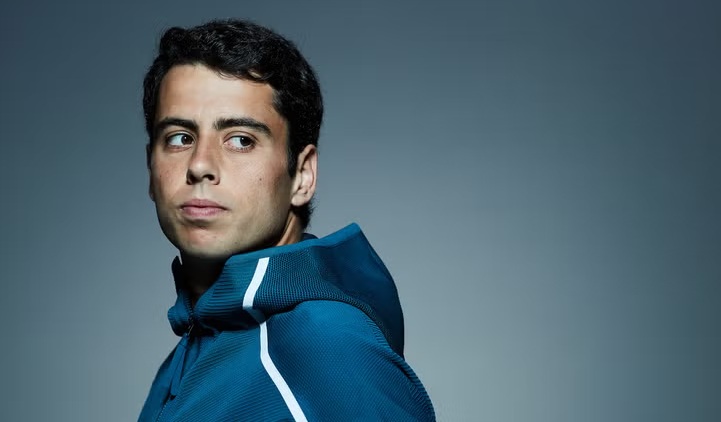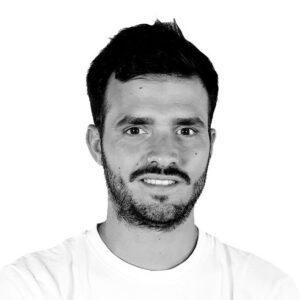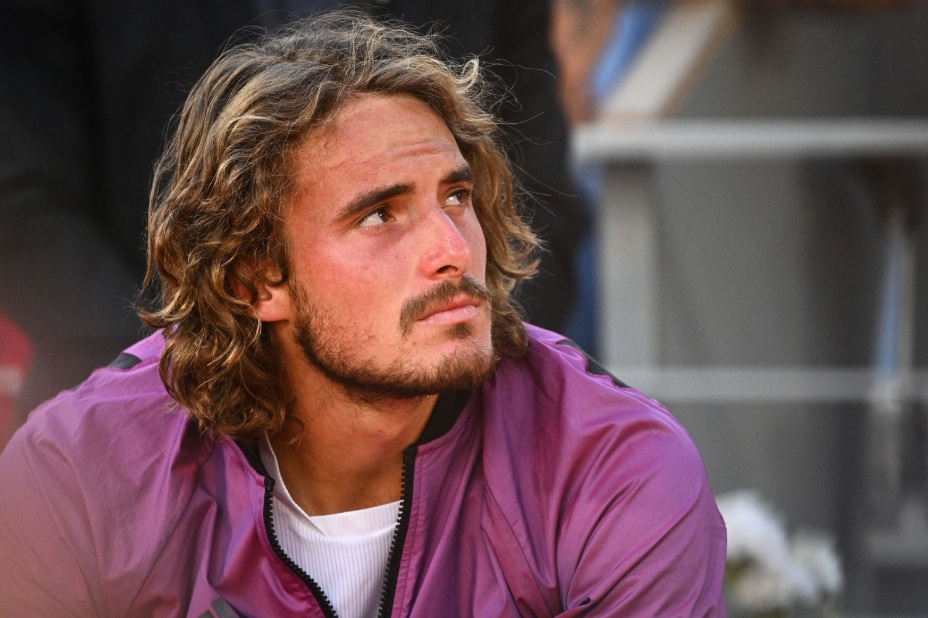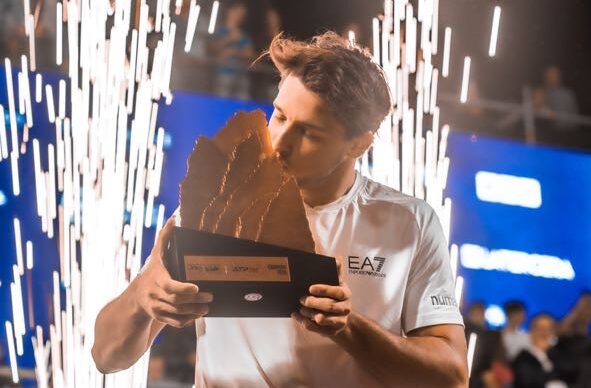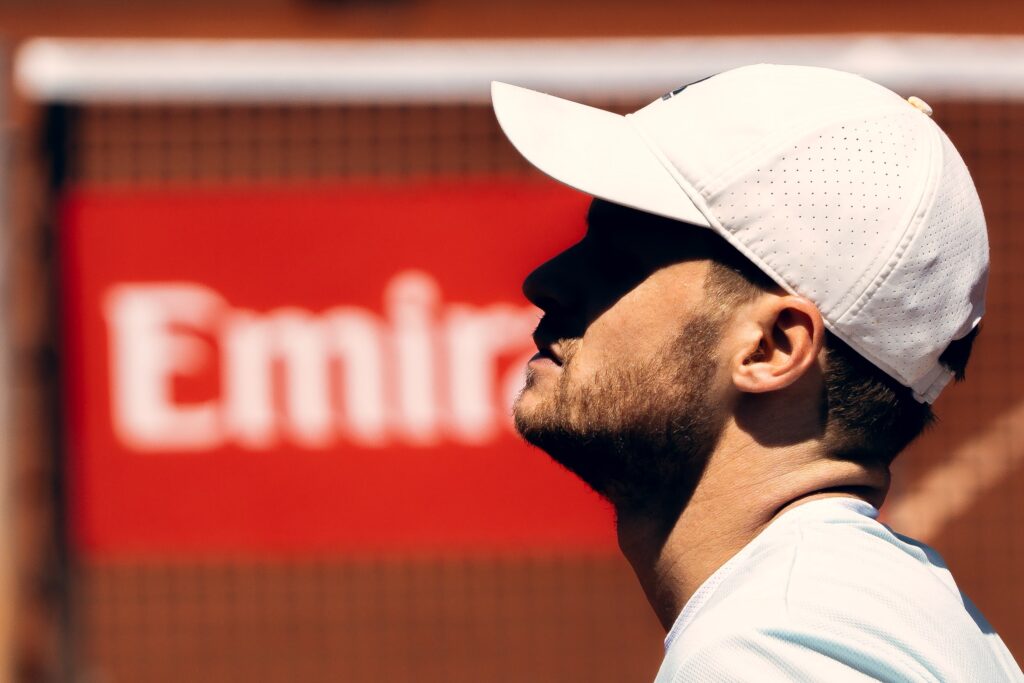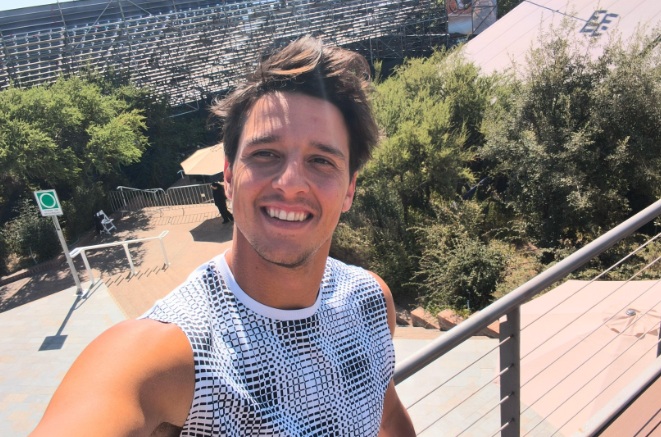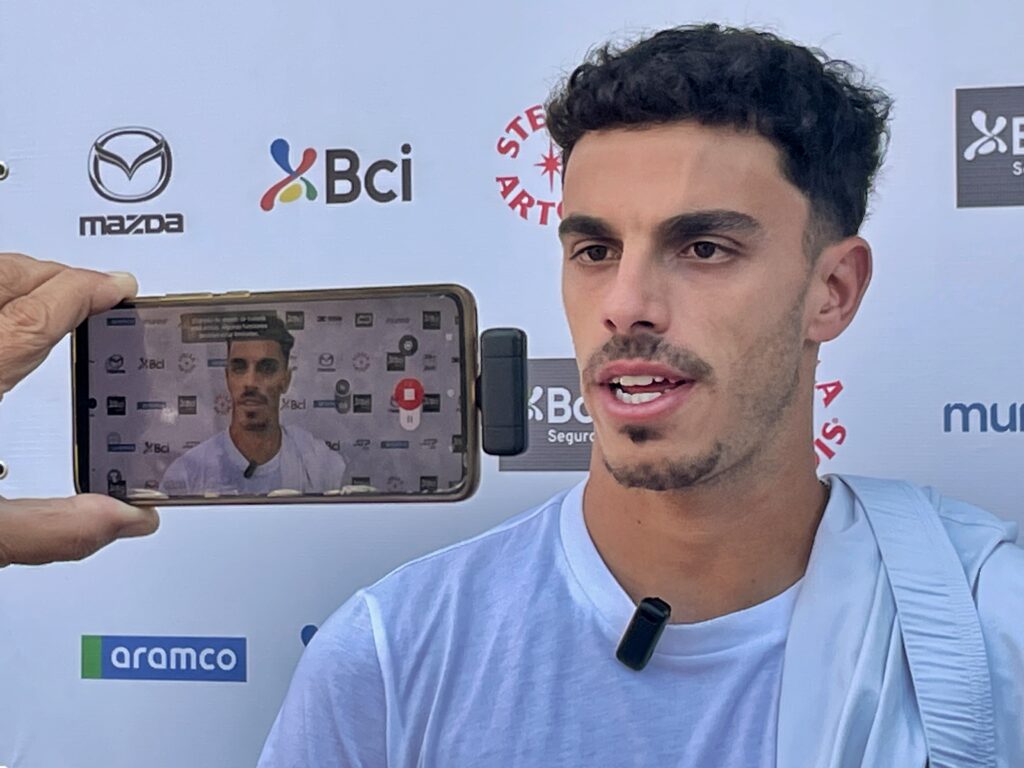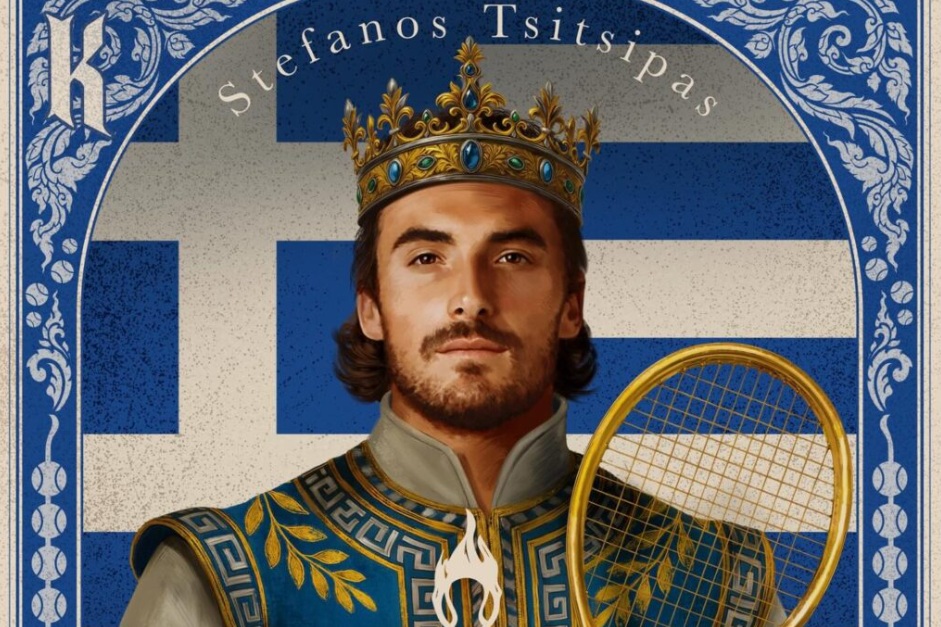“We work as hard than the players at the top — even harder,” he told CLAY in an interview also published by RG Media.
Psychological work has helped him control his emotions, which so often worked against him on court. He feels more mature, and you can sense it in the calm, thoughtful way he expresses himself: “That emotional instability I often had throughout the seasons has faded.”
He reads Plutarch, says he would have liked to be a neuroscientist if tennis hadn’t been his path, and it’s rare to see him awake past 10 p.m. Those are just a few strokes to describe a man who has had to postpone his honeymoon. He married on 8 November on his home island and should now be on a paradise beach. Instead, he is in Bologna, about to make his debut at the Davis Cup Finals. From Italy, Munar speaks to CLAY via video call.
In 2025, he has produced the best season of his career. He is No. 36 in the ATP rankings, his highest position, and is still chasing his first tour title: “What I’ve done this year is a success, but it’s not the success I’m looking for.”
Interview with Jaume Munar
– How are you? Do you feel any different kind of nerves?
– I’m very happy. Being part of the team is always an unforgettable experience. This year I’ve been able to play every tie and I’ve enjoyed it a lot. Every day with the Spanish team is a dream. We’re just waiting for Carlos (Alcaraz) to arrive and then we’ll all be here. We’ll support him as soon as he comes, and hopefully the thigh issue isn’t serious. We’ll see what happens here in Bologna.
– What is the Davis Cup for Jaume Munar?
– It means everything. It’s probably the competition I watched the most while growing up as a young player. I’ve been lucky to share many moments on tour with people who’ve had a lot of success in this competition. I’ve lived it closely in previous years, as a sparring partner, as part of the team one year (2017), although I had less experience then. And for me, for many years, being in the national team was a goal. Just being here fills me with indescribable excitement. I dream of whatever comes next.
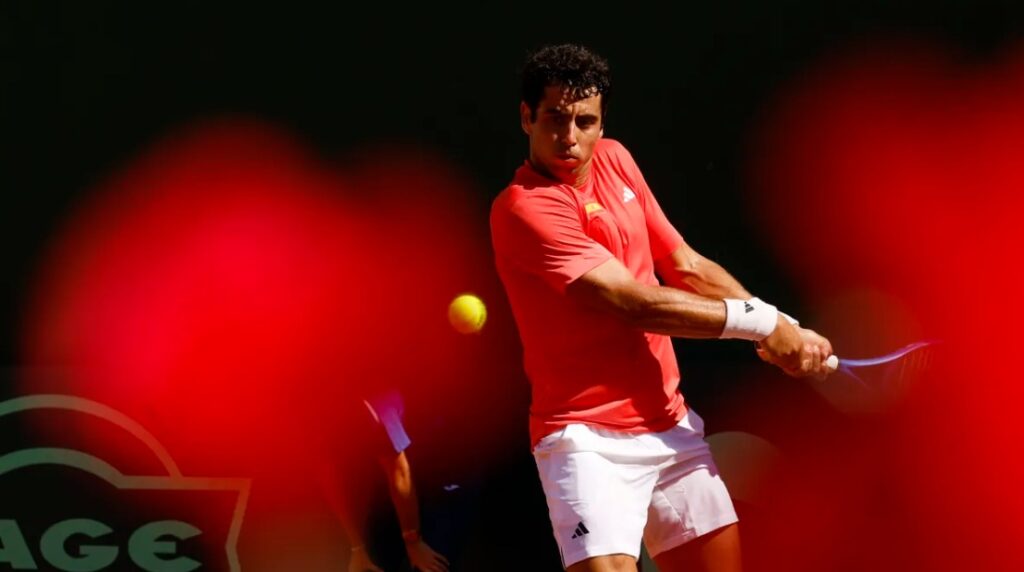
– Winning it would obviously be the perfect ending to your best season. What has happened this year?
– Yes, without any doubt. It’s been an exceptional year for me, more because of the tennis than the numbers or the wins. I think I’ve improved in practically every aspect of the game and I’m simply a better player than I was. The leap has been a bit radical, but the truth is I’ve been working for many years to get here. And the Davis Cup is a reward for a fantastic season, a reward not only for me but for everyone working with me, who were also very excited to see me here. I want to start and enjoy it to the fullest.
– Why did this leap happen this year and not earlier?
– First, maturity. I’m 28 and that obviously matters. And then I think it’s the continuation of all the work I’ve done over the years. I don’t want to speak of transitions or critical moments in my career, but shaping the player I am today has been the work of many years — far beyond professionalism — with the combination of all the people who have helped me, of all the coaches who have taught me, and surely with small changes I introduced in 2023 and late 2024 that have complemented the player I am today.
– I remember an interview in El País in August in which you said, “mediocrity no longer satisfied me.” How was that process? Did it satisfy you before?
– No, I suppose you have to put everything into context and I’m very realistic about my situation. I’m a kid from Santanyí, a town of 5,000 people, who watched all these phenomena on TV, dreaming of one day being in the top 100. But you keep taking steps, in tennis and personally, that lead you to a privileged position. For me, being in the top 100 was an absolute privilege. And I think I was relatively consolidated there, five or six years already, and then at some point you say, “I want a bit more.” In the sense that mediocrity doesn’t satisfy me means I had spent many years in the same place, I felt I had consolidated that, and I preferred to go into matches thinking I could be a bit better, even if that meant taking a small step back sometimes. It’s not that mediocrity satisfied me or not — I was just in a comfortable position, making money, having fulfilled my dreams, and I needed to mentally reboot and refocus on other things. I think I’ve done that, and with maturity and my level of tennis, everything has fallen into place.
– Did you force yourself out of a comfort zone to make that leap?
– Obviously, some steps are hard for some people and others are hard for others. For me, personally, leaving Rafa’s academy was a step, because when Tomeu (Salvà) was coaching me, I was, in the good sense of the word, comfortable with what I was doing there. I think being at the ranking I was at was already a success, but I needed the feeling of breaking with that, of searching for new frontiers and a new direction. And in that sense, Javi helped me a lot — he’s one of my best friends as well as my coach.
– You’ve always put a lot of pressure on yourself…
– Mentally, aiming higher, accepting errors much more — that was the hardest part for me. I’m someone with a lot of self-criticism and sometimes too hard on myself, and that was something that took me many years to understand — why I was so hard on myself, why I put myself under so much pressure. Because honestly, from the outside I never had that much pressure, I never felt it — it was more internal. And like I said, it wasn’t anything specific, it was more about resetting my mentality and setting new goals and new limits for my tennis.
– And now that you’ve proven to yourself that you had more inside, does it give you peace for the future, or does it force you to keep growing?
– Look, from humility — and I hope it’s understood — for me what I’ve done this year is a success, but it’s not the success I’m looking for. What I’ve done this year has opened a new door, a new world, but there’s a long road ahead. I firmly believe I can be a better tennis player — and I’m also very aware that with how tough the tour is and how competitive everyone is, I can also go backwards. But as I said, I think the path I’ve opened still has a long way forward — not in rankings or numbers but in tennis improvements I can make. And even within this very good year, the end of the season has been even better than the beginning, and I think the trend can keep rising. We’ll see where the future puts me, but I’m nowhere near satisfied with where I am today.
– Speaking of mentality: you’re a fiery player on court. How do you balance keeping the fire while also feeling the calm? What mechanisms or tools do you use?
– Two people have helped me a lot in this process, especially in recent years. One is Lorena Cos, my psychologist, who gives me the more professional part — the tools I need on court: routines, breathing, more repetitive mental work. And then also, even if it sounds like I’m throwing flowers her way, my wife has helped me a lot personally. She’s the total opposite of me: super calm, very positive, and having her by my side has given me a lot of confidence. She was going to be a gymnast and dreamed of becoming an Olympian, but two knee injuries ended that — and she has always looked at my career from the perspective of absolute privilege and luck, while I often fell into dark holes that were hard to get out of. And like I said, the professional help and the support from my wife have balanced my character. I am who I am — I accept it — but all that emotional instability I had throughout the seasons has faded. In the end, whether you like it or not, that means better work through the year — and better work means better results.
– In 2025, your best season, you have 30 wins and 25 losses. There are footballers who aren’t even in the top 500 who might need three years to lose 25 matches. Is tennis unfair in that sense, in that constant coexistence with defeat?
– It’s part of the journey. I’ve looked at it that way for years. I try to see everything I win, not everything I lose. The 25 defeats are normal, they’re the usual. What matters is how many victories you pair them with. So defeat is part of the process. Before, honestly, losses affected me a lot, but today I can say they affect me very little. Some hurt more, others less. Personally, the Roland Garros loss this year hurt me a lot, and the Davis Cup one hurt too. But at the same time, those were probably the two that pushed me the most to work hard and overcome everything. We’re used to it — once you turn pro, you lose almost every week you play. So you have to take it like that, otherwise it’s unbearable.
– I’ve heard you go to sleep every day at 10 p.m. Has that always been the case or is it part of a new routine?
– I’m a very daytime person. I like waking up early to do my things. And I love mornings. It’s nothing specific. I’m very social — if I need to go out for dinner with friends or family, I do it, and I don’t mind going to bed at 1 a.m. if needed. But yes, I like that routine. I feel good physically. I think it’s the healthiest thing for the life I lead, and I sleep well. It’s nothing imposed or controlled. It’s just that after a day of work, by 10:30 I’m ready for the bin.
– Does it bother you when tournaments schedule you for night sessions?
– At night tournaments I have to adapt. I try to adjust in the days before. I always remember Rio de Janeiro, for example, which is played very late. In the end, I treat it like jet lag — you need to adapt. The problem is when there are changes. When one day you play at night and the next day is daytime… That’s what makes it harder.
– Are you reading any books now?
– Yes, How to Listen, by Plutarch.
– And how is it? What is it teaching you?
– It’s long (laughs). I started it and I’m about to finish it. It’s basically teaching me that from calm and from tranquility, everything is understood better.
Tienes razón. https://t.co/7EcqSyIz7z
— Jaume Munar (@jamunar_38) May 8, 2025
– The tennis “middle class” is gaining visibility — with the Djokovic union’s demands and accounts on X supporting those players. It happens to Alejandro Davidovich, to Roberto Carballés… What does it mean to you?
– I’m not following it closely or anything, but I like it. I think it’s important that people — and I’m sure there are many beyond the Twitter accounts — appreciate the work we do. I think we work as hard or harder than the players at the top. And having that feeling of recognition is always very nice. I’ve had very little ego and I’m very happy when the people close to me support me, but seeing people from the outside enjoy what you do and understand and value it means a lot. And that’s why I always say jokingly that those accounts do good in the end. As long as everything is respectful and with a bit of irony, they’re good for tennis, and good for all of us.
– What defines you more: “Berridos de Munar” (Munar’s Roars) or “Magic Munar”?
– Both — I think it’s a dichotomy. I always say it jokingly, but it’s true. I used to be a volcano, now I’m calmer, but it’s all part of who I am. So I choose both because that’s who I am.
– And do you have any magic?
– Very little — I’m a normal guy, as I’ve told you. The simplest thing on Earth.

– Nadal has always been close to you — both from Mallorca, he supported you from a young age, and you trained at his academy. How do you think he is handling his retirement? Do you see him at peace with family, business, golf…?
– I do keep in touch with him, and I’m sure that like anyone moving from one stage of life to another, he’s had moments of doubt, of feeling down, of simply finding his new place and starting this new life. Because in the end, our lives as tennis players are a constant routine: training, sleeping, travelling, sponsors, blah, blah, blah, and starting again. And I think he’s had to adapt to that, but I think he’s doing really well. I know he’s happy, he has many things to do, and he’s a very simple person who loves everyday things, and I’m convinced he’s enjoying that. His family has always been above everything and still is, and I’m sure that with such solid foundations in his personal life, everything else is just a complement.
– For someone so attached to Barcelona like you, can you imagine him as president of Real Madrid, for example?
– I’m sure he’ll do things. I don’t know if Real Madrid’s president, or if he’ll be Davis Cup captain one day, or what he’ll do — but I always see him linked to sport, because it’s his passion above anything else.
– Not sure if you saw his Davis Cup tribute a year ago… what did you think?
– I wasn’t there. To be honest, I know people talked a lot about it, but I didn’t even watch it. The one that truly moved me, and I’ve always said it, was the one at Roland Garros. It was absolutely up to the level of who Rafa is and what he represents as a player and as a person.
If you enjoyed this interview with Jaume Munar, go check many more conversations with the great stars of the tour on this link to our site.
